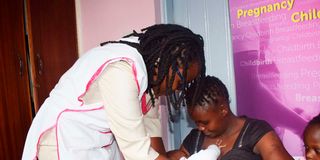How newborns suffer due to effects of climate change

Rosemary Shikari trains Linda Akinyi on how to position a baby during breast-feeding week on October 18, 2019.
What you need to know:
- Studies suggest that prolonged exposure to high temperatures can adversely affect lactation capacity, potentially leading to a decline in milk production.
- The balance is disrupted under long exposure to extreme heat, impacting the signalling pathway crucial for milk production.
The far-reaching consequences of climate change are now extending their grip onto the most vulnerable members of our society: newborns and infants. A recent study suggests that rising temperatures associated with climate change may negatively impact breastfeeding, with potential repercussions for infant nutrition and health.
Early initiation of breastfeeding and exclusive breastfeeding have long been recognised as crucial for child health. Establishing lactation demands regular breast stimulation and emptying to ensure an adequate milk supply for nutrition and hydration. This mechanism prevents infant dehydration and guarantees optimal nutrition for the growing child.
However, studies suggest that prolonged exposure to high temperatures can adversely affect lactation capacity, potentially leading to a decline in milk production. The balance is disrupted under long exposure to extreme heat, impacting the signalling pathway crucial for milk production.
The challenge intensifies during heatwaves as babies may show signs of dehydration, including restlessness, refusal to breastfeed, and reduced wet nappies. In periods of excessive heat, infants may exhibit a decreased appetite for breastfeeding, causing concern for mothers already grappling with heat stress.
Malnutrition, resulting from inadequate breastfeeding and nutrition has also been identified as a risk factor for other diseases, with infants born prematurely or with low birth weight being particularly vulnerable. Diminished water quality and quantity due to droughts further heighten the risk of maternal and neonatal health issues, including diarrhoeal diseases and infections.
Another study, conducted by The Climate, Heat and Maternal and Neonatal Health in Africa (Chamnha) consortium, including the London School of Hygiene and Tropical Medicine and Aga Khan University in Kenya, investigated the impacts of heat on mothers’ breastfeeding behaviours in Burkina Faso and Kenya.
Chamnha interviewed postpartum women three times over 12 months. They found out that “women spent less time breastfeeding when it was hot, equating to 25-minutes less on the warmest compared to the coolest days of the year”.
“For infants over four months old, hot weather had an even greater impact on the time spent breastfeeding. Women were less likely to exclusively breastfeed their very young infants in extreme hot weather. As temperatures increased, women provided supplementary fluids, mainly water, to their very young children,” says the study.
Mothers noted that elevated temperatures led to discomfort, heightened irritability, and increased exhaustion for both them and their infants. The babies were described as too uncomfortable to either sleep or breastfeed.
In Kilifi, Kenya, mothers shared that breastfeeding in the heat required them to remove their clothes, inadvertently causing their babies to unlatch from the breast. This effect on infants was believed to be exacerbated by the indoor heat and household air pollution generated during cooking.
The study recommends that cooling and shading should be prioritised in hot low-resourced settings, with understanding of how housing quality influences neonatal health. They also suggest that building materials are adapted to counteract rising ambient temperatures.
The study also recommends that mothers obtain adequate nutrition and hydration and be educated by healthcare providers on how to prevent dehydration and heat illness among babies.




